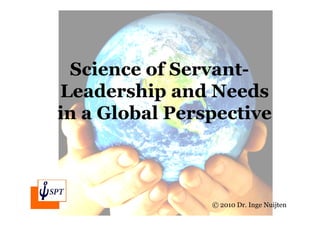
Multi-dimensional measures of Servant-Leaders
- 1. Science of Servant- Leadership and Needs in a Global Perspective © 2010 Dr. Inge Nuijten
- 2. Several questions I hope you’re able to answer… - How can we recognize servant-leaders? - How can research help practice? and VV? - How can research help students? and VV? - How can research help education? and VV? © 2010 Dr. Inge Nuijten
- 3. © 2010 Dr. Inge Nuijten
- 4. “… When an idea becomes popular I have to let go and move on to something else. But you’ve held on to the spirit of servant-leadership, you’ve kept it vague and indefinable, which I think is a great strategic advantage. People can come every year to figure out what the hell this is. And by not answering, they’re forced to come next year…” Peter Block (ISLC, 2005) © 2010 Dr. Inge Nuijten
- 5. Servant-leadership theory “Organizational goals will be achieved on a long term basis only by first facilitating the growth, development, and general well-being of the individuals who comprise the organization” Stone, Russell, & Patterson (2004) © 2010 Dr. Inge Nuijten
- 6. “The servant leader is servant first. It begins with the natural feeling that one wants to serve. Then conscious choice brings one to aspire to lead. The difference manifests itself in the care taken by the servant-first to make sure other people’s highest-priority needs are being served. The best test is this: Do those served grow as persons; do they, while being served, become healthier, wiser, freer, more autonomous, more likely themselves to become servants?” (Greenleaf, 1970) © 2010 Dr. Inge Nuijten
- 7. Can we define/find key denominators? What is really important? What is servant-leadership? © 2010 Dr. Inge Nuijten
- 8. The best test is… The ‘basic psychological needs’ (Ryan & Deci, 2004): Autonomie Binding Competentie © 2010 Dr. Inge Nuijten
- 9. Self-determination theory Investigating people’s inherent growth tendencies and innate psychological needs that are the basis of their self-motivation, personality integration, and personal well-being (Ryan & Deci, 2000). © 2010 Dr. Inge Nuijten
- 10. Self-determination theory The basic psychological needs have been related to, i.e.: - self-esteem, creativity, conceptual learning, and achievement (Ilies, Morgeson, & Nahrgan, 2005); - engagement, productivity, and wellness (Ryan & Deci, 2006). © 2010 Dr. Inge Nuijten
- 11. Another universal ‘need’ TRUST “It is almost impossible to deliver good performance without trust, because if trust is gone passion is replaced by fear” © 2010 Dr. Inge Nuijten
- 12. The Role of Trust Trust is important for different organizational outcomes: satisfaction, commitment, turnover intentions, performance (Dirks & Ferrin, 2002). Leader’s support for self-determination has been linked to trust (Deci, Connell, & Ryan, 1989). © 2010 Dr. Inge Nuijten
- 13. Interesting to study… Servant- Basic psychological Trust Leadership needs © 2010 Dr. Inge Nuijten
- 14. But… What is servant-leadership? © 2010 Dr. Inge Nuijten
- 15. Larry Spears Ten characteristics of servant leadership 1. Listening 2. Empathy 3. Healing 4. Awareness 5. Persuasion 6. Conceptualization 7. Foresight 8. Stewardship 9. Commitment to the growth of people 10. Building community © 2010 Dr. Inge Nuijten
- 16. Available theory and measures… • Graham, 1990 • Laub, 1999 • Page & Wong, 2000 • Russell & Stone, 2002 • Patterson, 2003 • Ehrhart, 2004 • Dennis & Bocarnea, 2005 • Barbuto & Wheeler, 2006 © 2010 Dr. Inge Nuijten
- 17. Empowerment Empowerment : a motivational concept focused on enabling people (Conger, 2000), Showing confidence in the follower’s integrity, ability and motivation, and attending to the follower’s feelings and needs (Bass, 2000). © 2010 Dr. Inge Nuijten
- 18. Humility Humility is the ability to look at one’s own accomplishments and talents in their proper perspective (Patterson, 2003). Rowatt et al. (2006) characterize humility as: down-to-earth and intellectually open, respectful, willing to admit imperfections, and a lack of self-focus or self-serving biases. © 2010 Dr. Inge Nuijten
- 19. Interesting to study… Servant- Basic psychological Trust Leadership needs © 2010 Dr. Inge Nuijten
- 20. Interesting to study… Empowerment Autonomy Trust Relatedness Humility Competence © 2010 Dr. Inge Nuijten
- 21. Results Study 1 © 2010 Dr. Inge Nuijten
- 22. Results Study 2 Note. The hypothesized paths are all significant p < .011 © 2010 Dr. Inge Nuijten
- 23. Performance? © 2010 Dr. Inge Nuijten
- 24. 2 December 2009: Toro Announces 20 Percent Increase in Regular Quarterly Dividend
- 25. Hypothesis Servant- Performance Leadership © 2010 Dr. Inge Nuijten
- 26. Results Study 3 F(2, 140) = 3.77, p= .03, ηp2 = .05 © 2010 Dr. Inge Nuijten
- 27. But what is servant-leadership? © 2010 Dr. Inge Nuijten
- 28. Empowerment
- 29. Humility © 2010 Dr. Inge Nuijten
- 30. Accountability © 2010 Dr. Inge Nuijten
- 31. Stewardship © 2010 Dr. Inge Nuijten
- 32. Standing back "Van een schouderklopje heeft nog nooit iemand een blessure opgelopen!" _ Foppe de Haan © 2010 Dr. Inge Nuijten
- 33. Authenticity © 2010 Dr. Inge Nuijten
- 34. Forgiveness
- 35. Courage © 2010 Ed Voerman & Dr. Inge Nuijten © 2010 Dr. Inge Nuijten
- 36. “A servant-leader has moral character, the wisdom to foresee what’s needed, the ability meet the needs of others and the courage to act on that.” © 2010 Dr. Inge Nuijten
- 37. Several questions to discuss - How can we share our knowledge worldwide? - How can we improve research? (needs?) - How can we improve education? (needs?) - How can we best help society? (needs?) - How can we best help future generations? © 2010 Dr. Inge Nuijten
- 38. Dank u wel! Als u (onderzoeks)vragen heeft: www.ingenuijten.nl E-mail: IngeSPT@gmail.com © 2010 Dr. Inge Nuijten